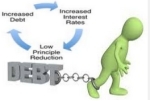One of the top business stories over the weekend is that household debt in the UK has reached a record level. There’s nothing new in this. We're all hearing for some time that prices have increased faster than wages; that loan sharks have been a serious problem for some time now; that people are struggling to cope.

Personal debt has increased. Individuals now owe a total of £1.43 trillion, including mortgage debt, slightly above the previous high. The previous record was set in September 2008, just before the effects of the financial crisis and the recession began to bite. Interestingly, against this background the government has said that relative to household income, debt had actually fallen.
The unions may say that workers are in debt because employers don’t pay enough. That may be true in some cases. But often employees are paid the market rate for the job and in others those in debt have been earning large salaries but had just assumed it would all be there and spent the future.
There’s no good time to have money worries. Perhaps three weeks before Christmas is one of the worst times. When employees get into debt, and feel they’re not coping it can cause anxiety and undermine work performance. Needless to say there’s a knock-on effect for you as an employer. The problem is, many people are either frozen with worry or go into a state of denial. If you’re able to help them get started down the road of addressing their problems, the workplace will eventually benefit too. We keep a list of organisations and contact details to give to clients so that worried employees have somewhere to start.
The simple truth is that your expenditure should not exceed your income. There is no other way of staying debt-free. The starting point is to get a clear picture of what you’re spending. You be amazed how few people really know what they spend their money on. Work out your weekly, monthly and annual expenses against your income. There are a large number of online calculators which make it very easy. Here’s one from Money Saving Expert http://www.moneysavingexpert.com/banking/Budget-planning
Once you know that you can decide where to start cutting costs and/ or changing spending habits.
There are also many organisations which will help employees make a plan to help them become debt-free. Here are just a few.
- Citizens Advice Bureau.
- The StepChange Debt Charity can also offer solutions via its online debt counselling service Debt Remedy.
- National Debtline offer free, independent advice via their websites or you can speak to one of their specialists by contacting their helplines. The National Debtline has also developed an online service called My Money Steps.
- Money Saving Expert. This website offers help getting debt-free as well as advice and ideas on cutting costs.
Being broke is tiring and it’s easy to slide into bad eating habits. Cheap and healthy (but interesting) recipes can be found on many sites. I particularly like this one http://agirlcalledjack.com/page/2/
You can’t take these steps for your employees, but if you give a helping hand and encourage them to take a step in the right direction, they are more likely to solve their problems, be happier and more productive at work.
Russell HR Consulting provides expert knowledge in HR solutions, employment law training and HR tools and resources to businesses across the UK.
Subscribe to our free monthly HR newsletter. Russell HR Consulting employment law newsletters are emailed automatically to our ever-growing number of subscribers every month.
Latest blog posts
- Is There a Santa Clause?
06 / 12 / 2023
- Lend Us a Hand!
22 / 11 / 2023
- What Happens When There is a Clash in Protected Characteristics?
17 / 10 / 2023
- Encouraging a Healthy Workforce 2
21 / 09 / 2023
- Encouraging a Healthy Workforce
23 / 08 / 2023
- What a Disaster - (But We Have a Cunning Plan!)
20 / 07 / 2023
- It’s Time We Stiffened the Sinews
14 / 06 / 2023
- Why Is It So Important to Develop Emotional Resilience?
16 / 05 / 2023
- When is a discretionary bonus not discretionary?
20 / 04 / 2023
- Recovering Training Costs 15 / 03 / 2023
